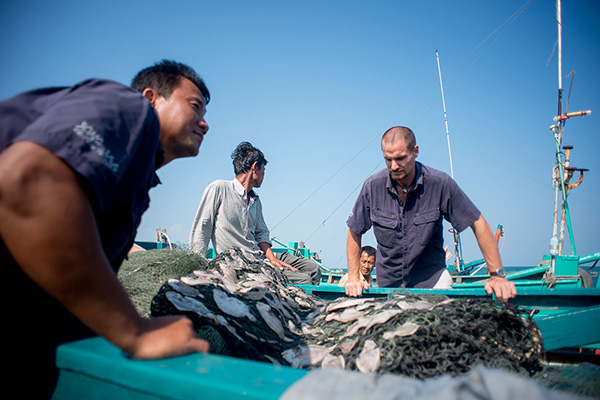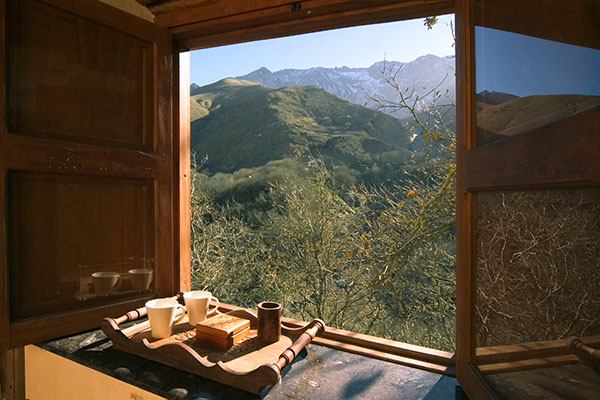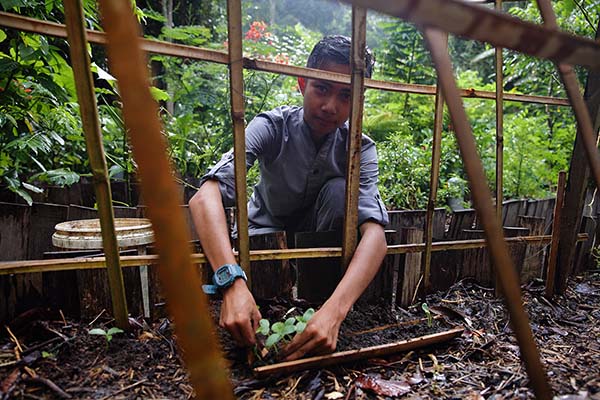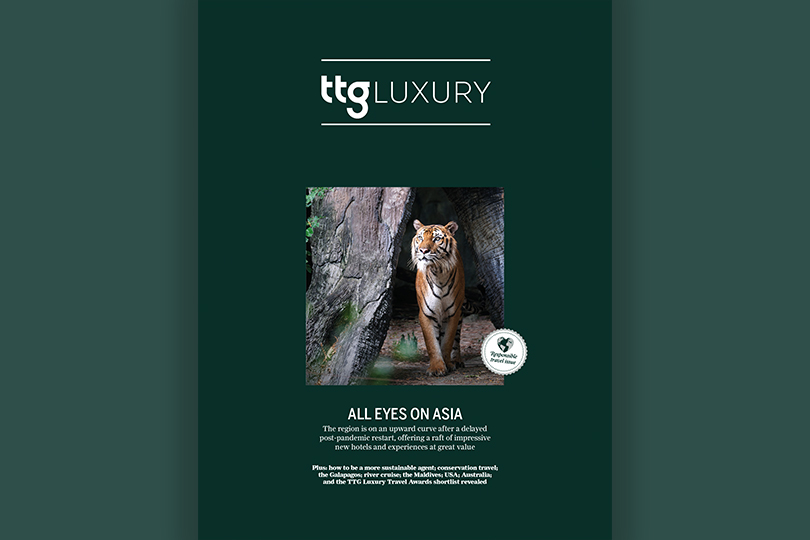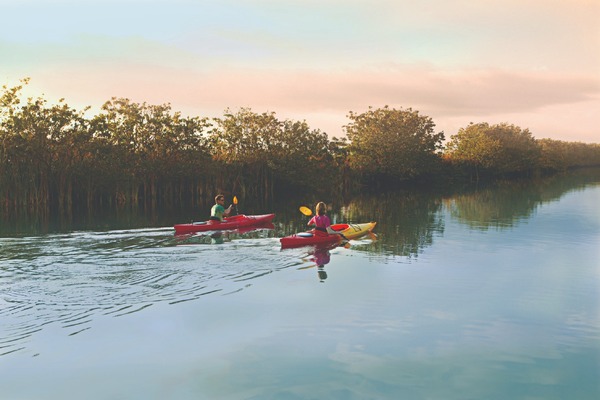Time to change: how is the luxury sector progressing with sustainability?
We’re not at the tipping point yet, so is the luxury travel sector doing enough to offer trips with a less negative impact on the planet and more positive experiences that give back, simultaneously making travellers feel good?

Brace yourself, dear reader. According to a new report commissioned by Intrepid Travel, the world’s largest B Corp-certified travel company, travel is not sustainable in its current form.
The report was produced by foresight agency The Future Laboratory after interviewing a range of sustainable travel experts, and Intrepid Travel’s co-founder and chair Darrell Wade says in response: “One of the problems with tourism at the moment is that it is the opposite of regenerative. It’s extractive – and this cannot continue for much longer.”
The report predicts future travel trends to change the tide could include new technology for travellers to track their real-time carbon footprints; cooler new summer destinations, swapping the traditional Med beach break for Belgium, Poland and Slovenia; pop-up hotels that leave minimal footprints; and spaceship-style sleeper pods on hyper-fast trains to negate the need for air travel.
But what of travel here and now? Is holidaying with a conscience the new luxury travel? Is it the responsibility of the luxury travel industry to be trailblazers in this field, and those who can afford it, to travel even more responsibly?
We’re all aware of over-tourism and climate issues becoming more prevalent and impacting travel such as wildfires, floods and extreme temperatures. As a result, are we seeing a demand from affluent clients to travel more sustainably? According to Booking.com’s 2023 Sustainable Travel Report, 43% of travellers are willing to pay extra for certified sustainable travel options.
If you want to book your clients a holiday that truly makes a difference, how do you do it, and how do you know who to trust? “Greenwashing” is a term coined by environmentalist Jay Westerveld in 1986, when he claimed the reuse of towels in hotels was promoted as a way to save water when in fact it was a cost-saving measure.
There are high-end travel companies out there who genuinely care about conservation for both people and planet. As Steppes Travel managing director Justin Wateridge says: “Tour operators shouldn’t be responding to a perceived increase in demand for sustainable holidays, instead they should be proactively educating clients about the choices they have, helping them to make informed and sustainable decisions. This is as much about doing the right thing as an ethical business, as it is about the need to future-proof our industry.”
Amanda Ho, co-founder and CEO of Regenerative Travel, believes that if travellers have the choice, they will be inclined to select the more regenerative or sustainable option. “It is about them having the awareness and options to make the right decisions. Often it’s about the storytelling of a place and looking to select a hotel or experience that is not your typical cookie-cutter hotel. It’s about enticing the traveller and offering something that is truly authentic and immersed in a sense of place.”
Intrepid Travel is working on ways to decarbonise trips, and in 2024, aims to have customers taking approximately 4,000 fewer flights compared to 2023, replacing journeys with high-speed train alternatives where possible. It recently launched a London to Madrid trip entirely overland on public transport, visiting Paris, Nimes and Barcelona.
Hazel McGuire, general manager UK & Europe for Intrepid Travel says: “Travellers are more conscious of the impact they have than ever before, so we’re seeing the demands of luxury travel changing. It’s becoming less about five star accommodation and more about having unique experiences that make you feel like you’ve done something good. Sustainable and responsible holidays are no longer a nice-to-have, but a must-have.”
Positive impact
Not content with merely offsetting a holiday, Pura Aventura aims to create a positive impact, as co-founder and chief executive Thomas Power explains: “Measuring and publishing the carbon produced on all holidays is crucial to help us all understand the environmental impact of our travels. With this information, consumers can demand to see what action is being taken, empowering them to make more choices about their travels.” Pura Aventura balances a carbon mile for every kilometre travelled by a client, from their front door and back again, an ambitious scheme that means the operator mitigates 160% of carbon. “Our guests can travel positive, and we can start to make a real difference,” Power adds.
Wild Frontiers has developed a collection of worldwide tailor-made Adventures with Purpose tours with a particular emphasis on sustainable adventure. Head of marketing Michael Pullman says: “We work closely with our partners to offer experiences that will have a positive impact on the destinations we travel to, the communities we visit and for our clients themselves. We are definitely seeing an increase in demand for green travel. It may not always be the primary driver – the destination still comes first – but it’s often the second consideration, as clients ask: ‘what impact will my trip have and how can I give back?’.”
Nick Clark, head of operations at Experience Travel Group, says sustainability is increasingly becoming a priority for their customers too. “We have an excellent carbon contribution scheme, encouraging slow travel and the use of trains to reduce internal flights, and we’re very selective with our nature and wildlife experiences. Our “Give Back Experiences” make a positive contribution to education or gender inequality, and to cultural or environmental conservation, and we also have tip-inclusive holidays.”
Luxury travel trailblazer, Original Travel, offers a Community Based Tourism collection of holidays where the focus is on community-owned and run accommodation and experiences. More recently, it followed that up with an Indigenous Tourism collection that turns the spotlight on the protection of indigenous people and their culture and traditions.
“By encouraging dialogue with indigenous people in the development of tourism, we hope to see a greater protection of that culture, enhanced economic benefits for local communities and a diversification of tourism experiences,” says Tom Barber, co-founder of Original Travel. “This is well-practised in some areas of the world where indigenous projects thrive due to tourism; from Kuku Yalanji Cultural Habitat Tours in Australia to the Kasbah du Toubkal property in Morocco, and with more emerging every year, such as the new Nemiah Valley Lodge in British Columbia.”
As well as working with partners they trust to provide positive-impact trips, agents can use some trusted benchmarks to gauge the responsible nature of companies they select for clients, such as are they a member of 1% for the Planet or The Long Run, and are they Certified B Corp? Do they promote travel by land and sea rather than flying? Do they give back to communities and environmental projects?
The Datai Langkawi, a resort hidden in the coastal jungle of this Malaysian island and largely unseen from the shore, takes the local environment and communities seriously. The Datai Pledge (thedataipledge.org) is a sustainability and conservation trust that supports Langkawi, a place with one of the highest concentrations of biodiversity on the planet, with 535 species of butterflies alone.
To date, The Datai has planted 2,570 saplings and saved 365,642kg of waste from going to landfill. And guests are encouraged to find out more about its work. “We support those who want to contribute to the protection of the surrounding forest, mangrove and coastal environments by offering a range of curated experiences that allow them not only to become actively involved in conservation, but also deepen their experience and knowledge,” says Stephane Duvacher, general manager of the resort. “Our range of workshops – which include upcycling at our dedicated space, beekeeping in our kitchen gardens and beach clean ups – help inspire guests to develop their own sustainable practices too.”
But there’s also no denying it’s a confusing landscape out there, with so many monitoring and authentication programmes. Regenerative Travel’s Amanda Ho says: “Due to the lack of a unified brand authority in this space, we are developing a specialised and comprehensive verification programme exclusively for hotels launching in 2024. This will entail conducting meticulous, in-person audits of all hotels to guarantee compliance with our standards, requiring all of our hotels to be verified once every three years.”
Ho is a big fan of resorts such as Song Saa Private Island in Cambodia, hailed as somewhere that epitomises the philosophy of having a positive impact. Dedicated to safeguarding the habitats of the Koh Archipelago and enhancing the wellbeing of its communities, it successfully established Cambodia’s inaugural marine protected area and planted more than 2,000 coral fragments. Through initiatives such as the Boat of Hope, essential resources reach remote communities, and their Waste Management Initiative not only addresses ocean waste but also empowers locals to do the same.
Dive holidays that care
In its recent Sustainability in a Recovering Travel World study, PADI (Professional Association of Diving Instructors)’s long-term partner The Reef-World Foundation (reef-world.org) found 95% of divers are looking for sustainable operators when booking a trip, but often struggle to book something like this with confidence.
In response to this, PADI has established the PADI Eco Center, a credential awarded to dive centres that demonstrate continued commitment to conservation efforts to support a global agenda to protect the ocean.
Original Diving (originaldiving.com) recently created 10 new itineraries to satisfy the demands of “waterculturalists”, divers who want to deepen their understanding of the seas and the life and cultures they support. Divers can get involved with new, innovative projects, including building reef highways in Fiji, planting coral in the Philippines, restoring coral in French Polynesia and diving with Bubu fishermen in Indonesia.
OUT NOW – TTG Luxury winter 2023
This special Responsible Travel issue focuses on Asia and how the region is on an upward curve after a post-pandemic restart, offering a raft of impressive new hotels and experiences at great value.
Plus, how to become a more sustainable travel agent, conservation travel, the Galapagos, river cruise, the Maldives, USA and Australia.

